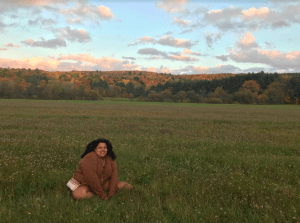Professors Adapting to Emergency Remote Teaching
Andrea Swiedom Staff Reporter
UMF professors adapting coursework to online platforms last minute has posed some unique challenges, but has also resulted in some positive surprises. Depending on the discipline, the transition has been as simple as utilizing Blackboard more than they did before, changing in-person lectures to Zoom classes, and recording lectures. Disciplines such as natural sciences have posed more difficult problems and require more creative solutions.
Professor Mariella Passarelli’s organic chemistry students luckily completed their basic lab requirements in the fall, but are unable to conduct the lab portion of their capstone projects. “Students have to plan and come up with the procedure to make a target compound – like an antiviral agent – and then try it out in the lab,” Passarelli said via email. “Students will still plan their synthesis, but they won’t get to try out their plan in the lab. They will still write about it.”
While Passarelli has managed to adapt the content, she iterated that there is no replacement for an in-person lab. “It does not matter how good the virtual lab is, it is not the same,” Passarelli said. “It is like virtually cooking instead of actually cooking, or watching a travel show as opposed to going abroad or playing a sport virtually; just not the same.”
Students in Professor Stephen Grandchamp’s English courses–Modern Love Sonnets in the Digital Age and Hip Hop History and Culture–are well-accustomed to digital programs as modern technological mediums are a staple of Grandchamp’s teaching.
Most recently in Grandchamp’s hip hop course, students watched the movie 8 Mile collectively and then discussed the movie together on Zoom. “That project works really well moving into digital modality. It’s been a pretty easy transition,” he said over a video chat in his Farmington home.
As manager of the Digital Humanities lab, Grandchamp has received several questions by other professors as to how to adapt course content to new platforms. “I would say my first rule is to make sure that you are comfortable with what you are doing. Don’t feel like you have to go into a digital program just because we are online this semester,” he said.
English Professor Dan Gunn has stuck to Zoom for the majority of his courses’ content and has found the breakout room feature the most useful for maintaining the discussion-based nature of his classes. This feature automatically generates groups of students into private discussions where Gunn can visit to listen in and help guide discussions.
Nonetheless, there are just certain aspects that he feels are lost in online platforms. “To me, it’s not the same because there’s something that you get from having the energy in the same room. It feels flat to me,” he said over video chat, sitting in front of a towering bookshelf in his Wilton home. “I like to read aloud. I don’t like reading to a screen, to people in little boxes. It feels unnatural to me.”
Yet, Gunn has been pleasantly surprised to see students maintaining high spirits and even making light of the current upheaval. When he enters the Zoom classroom for his Shakespeare course, he often finds his students playing Shakespearean version of hangman.
“I feel like people are getting a little more used to this so it’s not as intimidating as it once was. That’s true for me too, obviously,” Gunn said. “I’m really impressed with the way the students have been willing to adapt to that. I’ve had really good attendance in the last week or so.”
Passarelli expressed a similar nostalgia for in-person teaching since adapting her Forensic Science course to what she described as “guided inquiry” in which students go through videos, case studies, and PowerPoint presentations on their own. “I had a wonderful group of students this semester. We were having fun in that class, and I miss them,” she said.
Luckily, some positives have emerged from online learning. Both Grandchamp and Gunn noted that a handful of students seem to engage more online. “Some students seem more comfortable online than they were face-to-face,” Gunn said. “They have been more active and interested in participating electronically.”
Grandchamp has noticed that more students are reaching out to him during his office hours than they were before quarantine. “I think it feels a little more low-pressure to students than going to their professor’s office. They don’t have to be on video, and if they’re uncomfortable, they can turn their video off or they can just use the Zoom dial-in number. And I have given them my cell phone number just to text during my office hours.”
Passarelli is hopeful that this emergency transition to online learning will foster new strengths in her students. “I am hoping that the guided-inquiry style will teach my students how to be independent learners,” said Passarelli.
UMF’s emergency transition to online teaching has also provided students and professors with socialization, a basic need that is severely lacking in everyone’s lives under quarantine. “We’re all isolated, and this is a chance to talk to people so I think people have been really sweet with each other,” Gunn said.
Correction (4/27/20):
Gunn lives in Wilton, ME.
The hangman game was an activity Gunn’s students did before the switch to remote learning due to COVID-19 and Gunn “reconstituted” the activity over Zoom.
